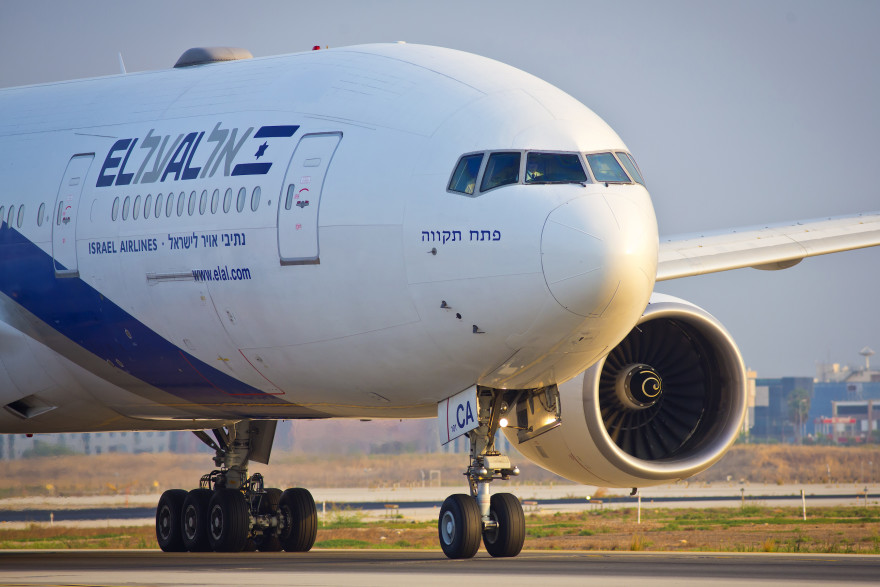
An El Al flight seen at the airstrip at the Ben Gurion International Airport, Aug. 5, 2013. (Moshe Shai/FLASH90)
TEL AVIV (JTA) — For approximately a half hour at the beginning of her El Al Israel Airlines flight last week from New York to Tel Aviv, Elana Sztokman watched as the haredi Orthodox man seated next to her rushed up and down the aisle searching for someone willing to switch seats so he wouldn’t have to sit beside her.
On the same route several hours later, another El Al flight was delayed as haredi men stood in the aisles refusing to sit next to women.
After takeoff, the men resumed their protest until other seats were found for them. A passenger on the flight told the Israeli website Ynet that the trip was “an 11-hour nightmare.”
Israel’s national airline has long had to contend with haredi Orthodox Jews insisting on gender separation in the skies. But the two recent incidents — Sztokman’s story went viral after she wrote about it in the online magazine Tablet — have prompted calls for El Al to resolve the ongoing issue.
Some have suggested that the airline insist that strictly observant passengers sit in their assigned seats. Others say the airline should create gender-segregated sections, so seat maps would not have to be reconfigured on the spot.
“What offends me is the premise that sitting next to me is a problem,” said Sztokman, author of the recent book “The War on Women in Israel: A Story of Religious Radicalism and the Women Fighting for Freedom.” “I’m a person first and foremost.”
Sztokman, who has faced similar situations on past El Al flights, said she has written the airline to complain several times but has not heard back.
In a statement responding to an inquiry from JTA, El Al made no mention of the Sept. 22 and Sept. 23 incidents, but said that the airline’s staffers “are trying their best to respond to every request of any of the passengers.”
An online petition launched Sunday is calling on the airline to provide a small section of gender-segregated seats for an extra fee. In two days, the petition garnered more than 1,500 signatures.
“I do think El Al has a responsibility to make its passengers feel safe and prevent this type of thing from happening,” the petition’s author, Sharon Shapiro of Chicago, told JTA. “I don’t think women should be harassed or feel bad or guilty if they can’t change seats. I don’t think men who feel it’s a halachic [Jewish legal] mandate that they can’t sit next to women should be put in a position that they have to nudge and ask.”
Special sections or flights for haredi passengers have been suggested before but never implemented. In a controversial move, some Israeli bus companies separated seating for women and men on several lines in 2010. In 2011, the Israeli Supreme Court ruled that forcing such segregation is illegal.
“If they rent the whole plane, El Al can run empty planes,” said Anat Hoffman, executive director of the Israel Religious Action Center, a Reform Jewish group. “But you can’t make people move because of their gender.”
Hoffman’s organization challenged El Al two years ago on gender segregation when an American woman, Debra Ryder, was forced to switch seats after a man refused to sit next to her. A lawyer for Hoffman’s group, Orly Erez-Litkhovsky, demanded that Ryder be compensated approximately $14,000 as a result.
El Al rejected the payment demand but said it would revisit its guidelines for flight attendants in terms of having them ask passengers to move or telling people to stay in their seats.
The man who was assigned a seat next to Sztokman’s eventually switched with another passenger. Sztokman said she hopes public outcry in the wake of the incident — including outcry from haredi Orthodox — will push El Al to take action.
“I hope this helps people within the haredi world think twice about whether this is the culture they want, and I hope this encourages women in Israel to speak more,” Sztokman said. “We have to speak more. We can’t just sit down and keep taking it.”
JTA has documented Jewish history in real-time for over a century. Keep our journalism strong by joining us in supporting independent, award-winning reporting.






